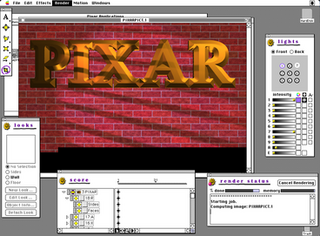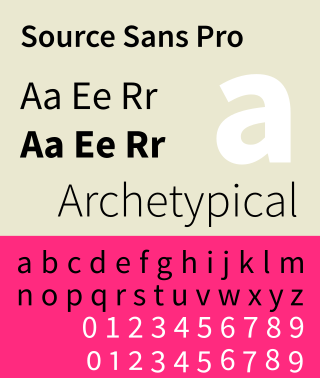Related Research Articles
TrueType is an outline font standard developed by Apple in the late 1980s as a competitor to Adobe's Type 1 fonts used in PostScript. It has become the most common format for fonts on the classic Mac OS, macOS, and Microsoft Windows operating systems.
Adobe Illustrator is a vector graphics editor and design program developed and marketed by Adobe Inc. Originally designed for the Apple Macintosh, development of Adobe Illustrator began in 1985. Along with Creative Cloud, Illustrator CC was released. The latest version, Illustrator 2023, was released on October 18, 2022, and is the 27th generation in the product line. Adobe Illustrator was reviewed as the best vector graphics editing program in 2021 by PC Magazine.
OpenType is a format for scalable computer fonts. Derived from TrueType, it retains TrueType's basic structure but adds many intricate data structures for describing typographic behavior. OpenType is a registered trademark of Microsoft Corporation.
FreeType is a software development library used to render text onto bitmaps, and which provides support for other font-related operations. The FreeType font rasterization engine is free and open-source software with the source code dual-licensed under a BSD-like license and the GPL. FreeType supports a number of font formats, including TrueType, Type 1, and OpenType.
Adobe Type Manager (ATM) was the name of a family of computer programs created and marketed by Adobe Systems for use with their PostScript Type 1 fonts. The last release was Adobe ATM Light 4.1.2, per Adobe's FTP.

FontForge is a FOSS font editor which supports many common font formats. Developed primarily by George Williams until 2012, FontForge is free software and is distributed under a mix of the GNU General Public License Version 3 and the 3-clause BSD license. It is available for operating systems including Linux, Windows, and macOS, and is localized into 12 languages.
This is a comparison of word processing software.

Multiple master fonts are an extension to Adobe Systems' Type 1 PostScript fonts, now superseded by the advent of OpenType and, in particular, the introduction of OpenType Font Variations in OpenType 1.8, also called variable fonts.
PostScript fonts are font files encoded in outline font specifications developed by Adobe Systems for professional digital typesetting. This system uses PostScript file format to encode font information.

Typestry is a 3D software program released in the 1990s by Pixar for Apple Macintosh and Windows-based PC computer systems. Unlike general purpose modellers and renderers, Typestry concentrated on rendering and animating text entered by the user in multiple fonts. The fonts were extruded into three dimensions, with various bevel styles and textures applied during rendering. Typestry creates 3D text with Type 1 and TrueType fonts and can do many different effects:

Adobe Fonts is an online service that provides its subscribers with access to its font library, under a single licensing agreement. The fonts may be used directly on websites, or synced via Adobe Creative Cloud to applications on the subscriber's computers.

Utopia is the name of a transitional serif typeface designed by Robert Slimbach and released by Adobe Systems in 1989.
FDK may refer to:

Stencyl is a video game development tool that allows users to create 2D video games for computers, mobile devices, and the web. The software is available for free, with select publishing options available for purchase. The software was originally called "StencylWorks" while in development and for the initial release but was later shortened to just "Stencyl".

Source Sans is a sans-serif typeface created by Paul D. Hunt, released by Adobe in 2012. It is the first open-source font family from Adobe, distributed under the SIL Open Font License.
Adobe Edge is a suite of web development tools developed by Adobe that enhances the capabilities of their other applications, such as Dreamweaver. The first application in the suite was released in August 2011 as a multimedia authoring tool designed to succeed the Flash platform. In September 2012, Adobe renamed the application Edge Animate, and announced Edge Reflow, Edge Code, and Edge Inspect. Also packaged with the suite are Edge Web Fonts, the PhoneGap application, and access to Adobe's Typekit service.

A variable font (VF) is a font file that is able to store a continuous range of design variants. An entire typeface can be stored in such a file, with an infinite number of fonts available to be sampled.

Source Han Serif is a serif Song/Ming typeface created by Adobe and Google.
The Unified Font Object (UFO) is an XML-based source file format for digital fonts. It was created by Tal Leming, Just van Rossum and Erik van Blokland. Contributors to the format also include Ben Kiel and Frederik Berlaen. According to its creators, the UFO is a "future proof" open format that is designed to be "application independent", "human readable and human editable".
References
- General
- Ken Lunde, CJKV Information Processing, Edition 2, O'Reilly Media, 2008, ISBN 0-596-51447-6, pp. 447–450